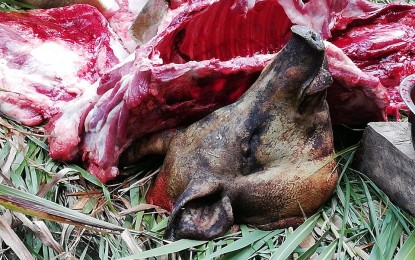
PIG FOR RITUAL. The provincial government has assured that there is ample supply of the pigs for Grand Cañao to celebrate Benguet’s 119th foundation anniversary. The butchering of pigs is a practice of the Benguet people who use the animal in ritual for offering to appease Kabunian (native god) and the ancestors to give their blessings and guidance. (PNA file photo by Liza T. Agoot)
LA TRINIDAD, Benguet-- Residents here who are considered meat-eaters and major consumers of pork meat will not settle for anything less in celebrating the 119th foundation day of Benguet.
“It's not affected, iba naman kasi, may sarili tayong produce sa Benguet, may sarili tayong baboy (We are not affected, it is different because we have our own produce, we have our own pigs),” Governor Melchor Diclas told the Philippine News Agency (PNA) on Friday on the possible effect of the African swine fever (ASF) to the celebration.
He said their data in 2017 shows the province has 45,000 heads of pigs at one time which come from the 13 municipalities. The number has grown higher considering the demand as Benguet produces mostly black pigs for its needs.
Diclas said even if there are no pigs from the other provinces, Benguet will be able to sustain its needs for the festivities.
The government issued Executive Order 2019-36 on September 17 for the temporary ban on the entry of live pigs, fresh and frozen pork and all pork products from provinces and cities affected by ASF.
He said the provincial veterinary office, as well as its agriculture office, has assured that the province has ample supply of hogs for daily consumption and for the festivities of the province and the several towns that also celebrate the foundation day in November.
Pigs play vital role in Grand Cañao
Diclas said there will be at least 21 pigs to be provided by the province during the Grand Cañao on November 23.
Each town will receive a live pig, which it can add on to what it will prepare for the visitors who will partake of the food.
The provincial government, however, will have eight pigs to butcher on said day. Some municipalities will have three to five pigs butchered on that day.
Vice governor Johnny Waguis said the Cañao is a thanksgiving for the blessing that “Kabunian” (native god) has bestowed to the province and the people and for keeping them safe from calamities and disasters.
As a practice, people of Benguet butcher as much pigs to celebrate an occasion, observing the traditional “owik”.
The pig is killed by piercing its heart using a pointed wood. It is then butchered the traditional way, bringing out the liver while a “mambunong” (native priest) interprets the size and location of the bile.
The mambunong says a prayer in the native dialect, usually asking Kabunian and the ancestors for guidance, protection, and blessings.
The pig is cut in large chunks, boiled in water without any spice, vegetable or extenders and is partaken by everybody- locals or guests.
Each person is given a big piece or two weighing about 150 to 200 grams each, sometimes more, which they do not need to eat on-site but needs to bring home as their share from the blessings.
People are also encouraged to bring their plastic containers for them to bring home their “share” or what is called “wat-wat”. Soy sauce with chili spice is also provided to add flavor while everybody eats with their bare hands.
During the Grand Cañao, residents from the 13 municipalities troop to the Wangal sports complex at this capital town where the festivities are held. They all partake of the “wat-wat”.
There are 14 parachute tents in the area- one for each of the towns and one at the center for the provincial government. It is there where they will entertain guests while there are gongs being beaten and people doing the “tayao” (native dance) as food and rice wine are served.
Protecting hog raisers
Diclas said animal quarantine stations have been set up on all the roads leading to the province -- Naguilian Road from Bauang, La Union; Marcos Highway from Pugo, La Union; Benguet-Vizcaya Road from Kayapa Nueva Vizcaya; Baguio-Bontoc Road from Mountain Province. Kennon Road from Rosario, La Union is also within Benguet’s jurisdiction which is currently closed to all types of vehicles.
The governor said the executive order does not allow hogs to enter all the roads to Benguet.
Diclas, however, said the problem is in Baguio, which is located at the center of the jurisdiction of Benguet.
“Our quarantine stations only allow pigs to enter if there is a certification that it will be for Baguio and that the delivery is complete with a certification that the pigs are ASF-free,” he said.
He said they are only protecting the province from being affected by ASF as several Benguet residents are engaged in swine production due to the culture attached to pigs.
"We are being vigilant because we want to protect our province-mates who are into hog raising. We do not want to kill their livelihood. We do not want their animals to be infected because if Benguet is affected, it will really spread throughout the province,” Diclas said in the Ilocano dialect,
He said they hoping the virus will not reach the province and that ASF will soon be contained. (PNA)
